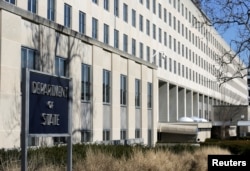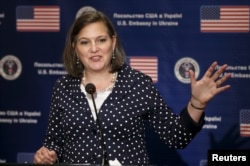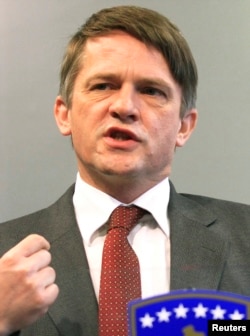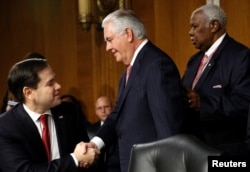Five diplomats in the senior management team at the U.S. State Department have stepped down, only days before President Donald Trump's choice to head the department is expected to receive Senate confirmation and take over.
One of the five diplomats was on a plane flying to Europe for a high-level meeting when he was ordered to turn around and return home, diplomatic sources told VOA.
"This is not normal procedure. It's not coincidence," Bruce Jentleson, a former senior adviser to the State Department's policy planning director, told VOA.
The Duke University professor of public policy and political science added: "If it wasn't coordinated, it's even more significant."
Career diplomats at the department, however, bristled at news reports Thursday blaming the new administration for "mass resignations" or "firings."
"The context for this is completely missing," said Ambassador Barbara Stephenson, president of the American Foreign Service Association (AFSA), the professional group and labor union for the U.S. Foreign Service.
"Rotations to new positions and retirements after a fixed number of years of service are part of the DNA of the foreign service," Stephenson told VOA. "It's normal that a change of administration brings a change of personnel."
The two most high-profile names exiting are Undersecretary of State for Management Patrick Kennedy and Victoria Nuland, assistant secretary of state for European and Eurasian Affairs. Also leaving are two other assistant secretaries -- Joyce Barr for Administration and Michele Bond for Consular Affairs.
Another prominent departure is Ambassador Gentry Smith, director of the Office of Foreign Missions.
And late Thursday U.S. officials confirmed to VOA that Thomas Countryman, a career diplomat who has been serving as Acting Under Secretary for Arms Control and International Security, is retiring next week.
Diplomatic sources say Countryman was on a flight to Rome for a meeting on non-proliferation when he was ordered to turn back and return home. The State Department declined to comment on that information.
Mark Toner, acting State Department spokesperson, said in a statement earlier that the senior managerial posts now vacant are political appointments, requiring a presidential nomination and confirmation by the Senate.
"Of the officers whose resignations were accepted, some will continue in the Foreign Service in other positions, and others will retire, by choice or because they have exceeded the time limits of their grade in service," Toner said. "No officer accepts a political appointment with the expectation that it is unlimited."
"There's always turnover," Brett Bruen, president of the Global Situation Room strategic communications firm, told VOA.
"Usually it's not so sudden and doesn't leave such a gaping hole in the department's core management team," he added. Bruen is a former diplomat and ex-director of global engagement at the White House.
Neither the State Department nor the officials have linked their departures explicitly to the Trump administration.
News of the diplomats' departure follows a visit to the State Department by Secretary of State-designate Rex Tillerson on Tuesday.
Kennedy, who spent 44 years at the State Department, is retiring. His departure seemed likely after Trump's surprise victory.
Kennedy had been embroiled in the controversy surrounding the private e-mail server of former Secretary of State Hillary Clinton, whom Trump defeated in the general election.
Kennedy was said to have pressured the FBI to declassify information in one of the e-mails, in return for allowing more FBI agents to be posted overseas. The State Department denied any quid-pro-quo was offered.
Kennedy was appointed to his management position by former President George W. Bush, and he held the post throughout former President Barack Obama's eight years in office.
"Given the talent available in our diplomatic corps, we expect that the new secretary will have no trouble finding the right people at State to fill out his senior leadership team," AFSA said in a statement.









